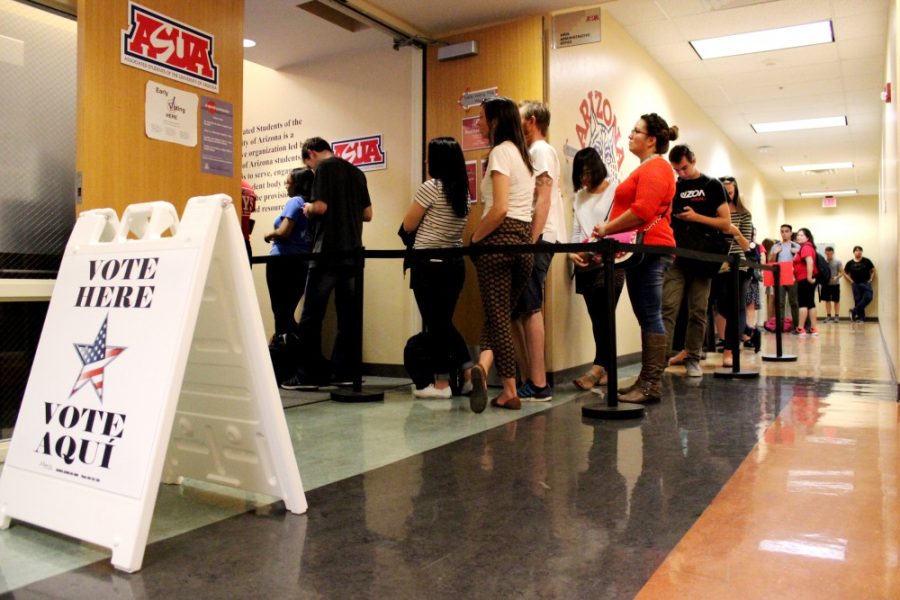On the final day of early voting on campus for the Nov. 8 general election, an hour-long line filled the hallway leading up to the Associated Students of the University of Arizona office.
The line was filled with many voters who were voting for the first time.
“I’m voting because it’s my first time voting and people fought for my right to vote, so I should go through with it,” said Sabrina Huaraque, an undeclared freshman. “I think the most important part is getting out and actually voting.”
RELATED: U.S. millennial generation may hold weight in 2016 election
Pooja Dutta, a pre-business freshman, agreed with Huaraque, and said voting is an important way of being involved with the community.
“This [election] just happens to be very historical because there’s so many different views and people in the election that you don’t usually see,” Dutta said.
The minutes standing in line are the final time for ideas to be changed before the vote is cast.
Lauren Pisani, a biochemistry sophomore, said she did not want to share her political views while waiting in line to avoid a debate due to the controversy surrounding the election.
“I prefer to keep it private,” Pisani said. “It’s my personal opinion and I don’t think others should try and influence that.”
Tucson resident Edgar Texas also said he feared sharing his political views, but that the fear came from the election as a whole.
“I would say something I’ve noticed about this election is how it’s brought in different opinions, and they seem to be strong,” Texas said. “[Saying] I was voting for Trump was something I was [hesitant] to say because it’s a strong opinion for somebody who’s voting for him, but like I said, I’m completely against Hillary, so when I find someone voting for her then I’m very opinionated.”
RELATED: Social media crucial in presidential election
Some voters were more focused on how the election will impact people at the local level than who will be president.
Mallory Roeder, an economics junior, said she cared more about raising minimum wage and legalizing marijuana through the two propositions on the ballot.
“At least, for me, raising the minimum wage is something I care about,” Roeder said. “I work as a hostess at the Senae Thai Bistro. We shouldn’t be lowering people’s wages, we should just be discounting other things around businesses like rent.”
Jesse Lewis, an applied biosciences graduate student, was also more interested in other parts of the election than the presidential decision, and said Proposition 205 would be beneficial for the economy if it were passed.
Pisani’s biggest fear, he said, is that we don’t really know what is going to come.
“The candidates can say everything they want to say and what they plan to do,” Pisani said. “But what actually is going to happen is very, very unknown and unsure, and that’s scary.”
Lewis, on the other hand, did not share that fear.
“I think we have the chance to have some drawbacks in the future depending on the election,” Lewis said. “But, realistically, the government is such a big machine, it doesn’t change that drastically depending on who’s the figurehead.”
Texas expressed the same lack of apprehension and trust in the system of government, such as how the Senate will also make decisions. He believed that what’s going to happen is going to happen.
“Presidential—worst comes to worst, someone gets impeached or in in four years, they’re out,” Roeder said. “I don’t think in four years the country will be burning.”
Registered student voters who did not vote early can vote on campus in the First United Methodist Church on Park Avenue and Fourth Street on Nov. 8.
Follow Rocky Baier on Twitter.









